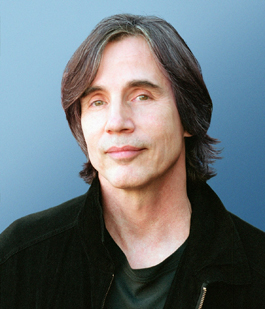home | north bay bohemian index | music & nightlife | band review

These Days: Jackson Browne's current live music restores the idealistic yearning that anchors the big picture of his career.
Ageless Fountain
Reevaluating Jackson Browne's hackneyed wimpiness
By Karl Byrn
After 40-plus years in the music business, Rock and Roll Hall of Fame inductee Jackson Browne understands the uncertainty that makes his work tick. "What's your pleasure?" he knowingly asks the audience on his newly released disc Solo Acoustic, Vol. 2. "I could sing you a really tender song filled with despair . . . or a really weary song laced with hope." The audience laughs gently, cheering for the forlorn beauty of "Fountain of Sorrow." He laughs back, joking that the song has "a gigantic dollop of good will."
Browne's new disc extends the warm, live-recording intimacy of his 2005 release Solo Acoustic, Vol. 1, and also offers a preview of what local fans can expect when he brings his solo acoustic tour to Santa Rosa on April 16. Together, Solo Acoustic, Vol. 1 and Vol. 2 connect the dots in his storied body of work, mixing hallmarks from his classic '70s singer-songwriter era with a healthy dose of his solid but largely ignored later work, with only a touch of his uneven '80s hits and politics. The two live volumes don't make a complete best-of, but instead reveal the circular, single shape of the heart that Browne wears on his sleeve.
A reliable axis of tender despair and weary hope cemented Browne's stature as the great California post-hippie rock-poet, but left him open to future disinterest. Even in his heyday, critics read his fresh and weighty poetics differently. "Jackson Browne is the most accomplished lyricist of the '70s," wrote American roots populist Dave Marsh, while arty, urban academic Robert Christgau complained that "there are a hundred country cheatin' songs with more truth in them than any but five or so of Browne's."
As a '70s teenager, I was drawn to his semi-truths—not casting him as a literate sage or a hackneyed wimp, but thrilled by the very incompleteness and simplicity of his struggles. His questing good-guy honesty and perpetual irresolution seemed like the whole point, the very thing that made his music essential rock 'n' roll.
After his early '80s stadium success, more overt political content that explored global rhythms mitigated Browne's soul-searching balladry. Ironically, as his records stuttered, he gained real-world credibility, with an arc of progressive activism that extends from spearheading the 1979 No Nukes concert to his current support of the Kensington Welfare Rights Union, a grassroots group that promotes empowerment of the poor.
Outspoken activism notwithstanding, Browne has never really emerged as an alternative hero like contemporaries Neil Young and Bruce Springsteen, two comparable '70s songwriters who have sustained a rare undiminished reverence among indie-rockers and hip music media. Browne's impact has thrived more indirectly, from the ongoing relevance of alt-country to new chart balladeers like Jack Johnson to the confessional basis of emo-rock's romantic unrest.
Browne's current live music restores the idealistic yearning that anchors the big picture of his career. Solo Acoustic, Vol. 2 highlights some post-classic gems, like the punchy "Enough of the Night," from his forgotten 1989 disc World in Motion, and the loving "Sky Blue and Black" from his 1993 return-to-form I'm Alive. Four songs come from his latest studio album, 2002's relaxed, substantial The Naked Ride Home, including the brooding social critique "Casino Nation." Browne is planning to release a new studio album later this year. Meanwhile, if I were to answer his question about pleasures from his catalogue, I'd pick a whole new Solo Acoustic, Vol. 3, dug from all over his ageless fountain of sorrow and hope.
Jackson Browne performs on Wednesday, April 16, at the Wells Fargo Center, 50 Mark West Springs Road, Santa Rosa. 8pm. Sold-out. 707.546.3600.
Send a letter to the editor about this story.
|
|
|
|
|
|